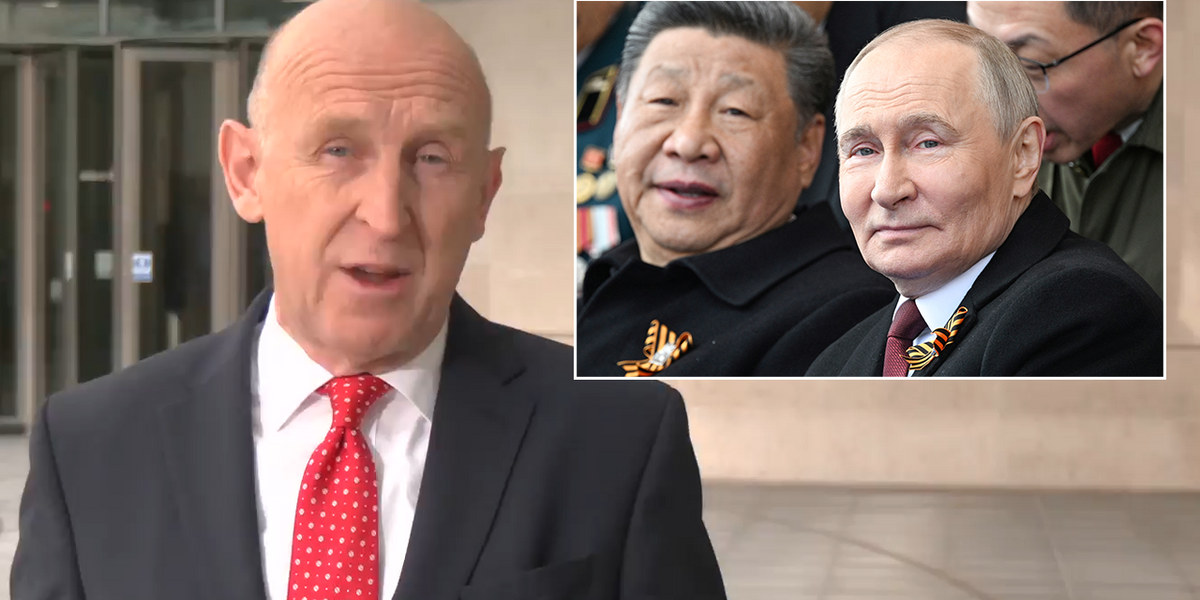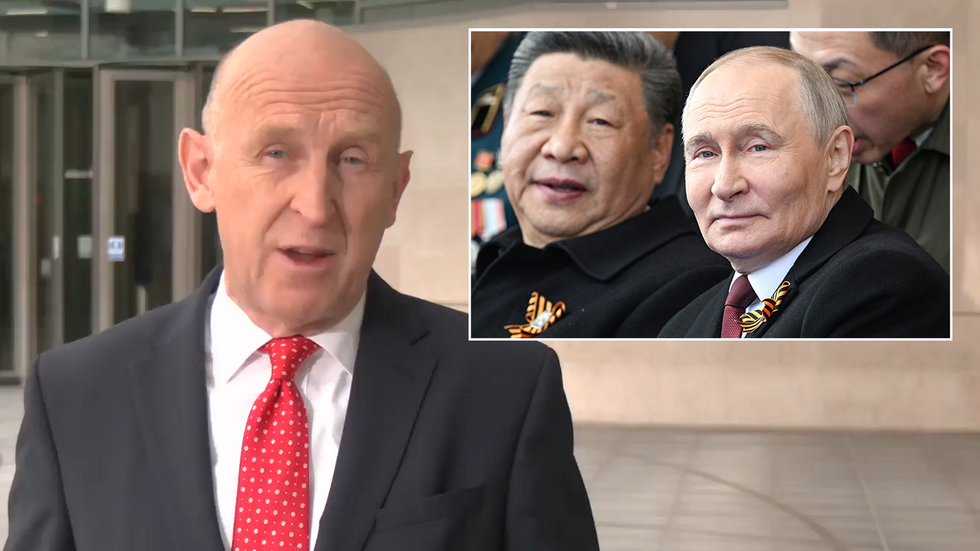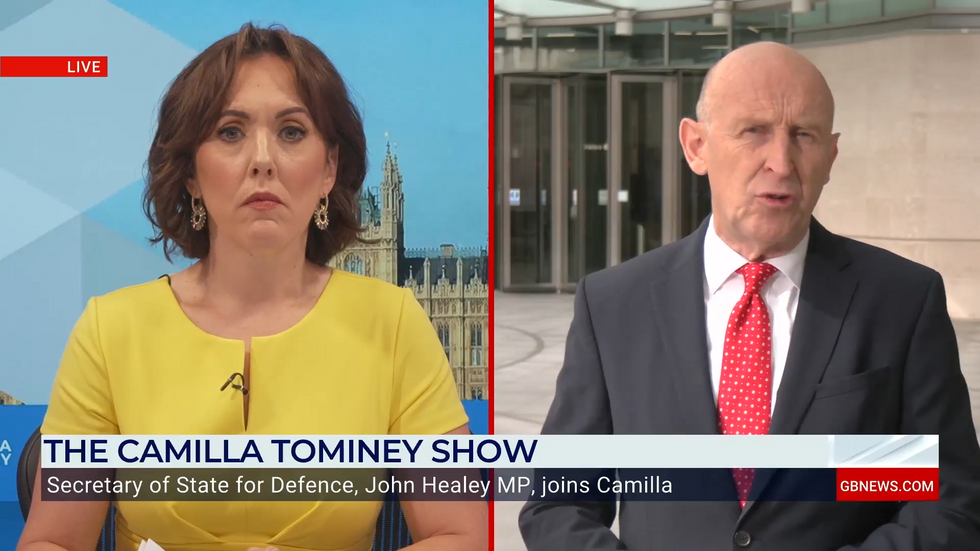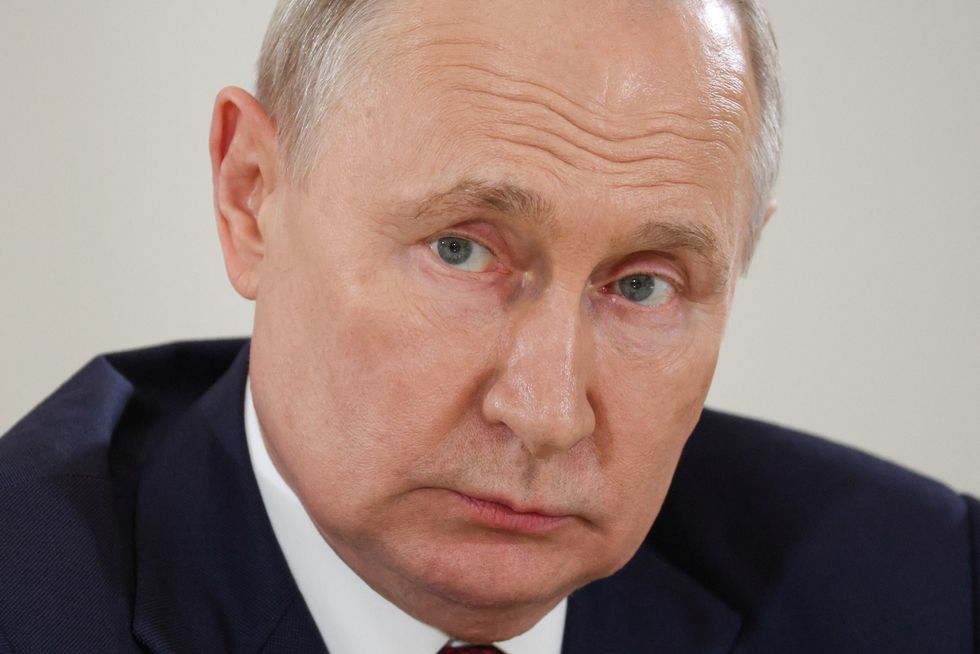



Labour Defence Secretary John Healey has explained why the UK Government is seeking its biggest defence expansion since the Cold War.
Speaking on GB News, Healey said Labour will focus on delivering a supercharged cyber force to target ‘hostile states’ like Russia and China.
He told Camilla Tominey: “I’ve been quite shocked by this. I took over as Defence Secretary 10 months ago and defence has been the subject of 90,000 cyber attacks linked to other states.
“With that level of aggression, with that level of threat, it is quite clear that the keyboard has become a weapon of war.

John Healey spoke about the decision to ramp up the Government's efforts to defend Britain against the likes of Russia and China
GB NEWS / REUTERS
“In the last couple of days, I have made a commitment to putting £1 billion into the digital upgrade of our armed forces so we can link AI autonomy and drones to the hard metal of tanks, artillery and planes.
“We will also establish a new cyber command to try and deal with these threats.”
Asked whether there’s a “contradiction” in Government policy considering its decision to hand the Chagos Islands to Mauritius, a close ally of China and Russia, he said: “Diego Garcia is a very special base we share with the Americans.
“It is fundamental to our and their intelligence and defence. It has an airfield and a deep water port that allows our nuclear powered submarines and carrier to dock.

John Healey defended the Government's decision to hand Chagos over to Mauritius
GB NEWS
“It allows us to deploy our armed forces around the world. We had to secure it. The future of the base was jeopardised and this is the only way of securing the operational sovereignty of that base in the next 99 years.
“It’s a good deal for our armed forces, it keeps Britain safer and that’s why it has the support of the US, it has the support of India and it has the support of the UN.”
While UK ministers had previously confirmed cyber operations against non-state actors like Islamic State, they have not until now acknowledged attacks against other countries. Healey's statement represents the government's most explicit confirmation yet of Britain's intent to conduct offensive hacks against hostile nations.
The announcement follows the inauguration of Britain's new Cyber and Electromagnetic Command, which will coordinate both defensive and offensive operations, including hacking into enemy systems to disrupt attacks and spread of propaganda.

Russia is behind a significant number of the 90,000 cyberattacks
ReutersSpeaking from MoD Corsham, the UK's military cyber headquarters, Healey declared that "the keyboard is now a weapon of war." He stressed the urgency of the situation, noting: "We are under daily attack, increasing attacks, and this is the nerve centre of the UK's military that helps us defend against these attacks."
The new command will work alongside the existing National Cyber Force, a joint venture between GCHQ and the MoD that has conducted hacking operations for the past five years. This integrated approach aims to "fight enemies on the web and lead defensive operations."
The government has allocated over £1 billion for a "digital targeting web" to enable real-time battlefield intelligence-sharing between troops, spy planes and satellites. This AI-powered system, colloquially known as a "kill web," is designed to be operational by 2027.
The investment will leverage artificial intelligence to enhance the responsiveness of all three forces, connecting military systems for faster decision-making on the battlefield. Healey explained that the technology will ensure the UK's military can "act at speeds never seen before – connecting ships, aircraft, tanks and operators so they can share vital information instantly and strike further and faster."
The enhanced targeting systems draw lessons from the war in Ukraine, where Healey noted that "those that prevail will be those who are not just better equipped and better trained, but better connected and also capable of innovating ahead of adversaries."
The Ministry of Defence has faced an alarming 90,000 cyberattacks in the last two years alone, doubling the number recorded in 2023. Hostile states including Russia, China, Iran, and North Korea have been identified as perpetrators of these attacks.
Healey described the situation as a "continual and intensifying" level of cyber warfare against Britain's military infrastructure. The scale of attacks underscores the urgent need for enhanced defensive and offensive capabilities to counter what officials characterise as persistent threats to national security.
